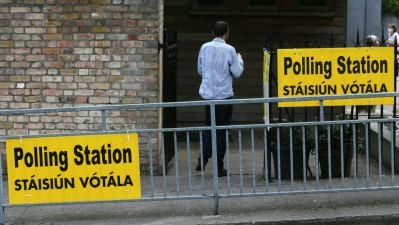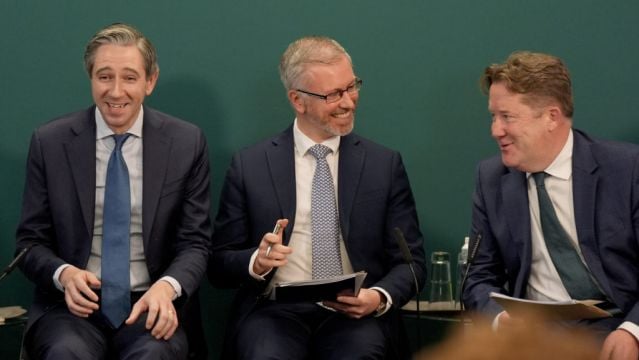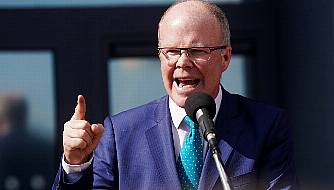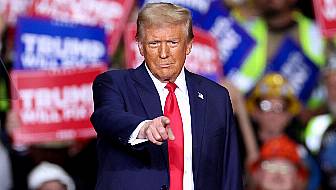After months of speculation, the coalition leaders have confirmed the general election will be held in 2024.
Here's everything you need to know about the general election.
What is a general election?
A general election is a vote by the people of Ireland to decide who will represent them in the Dáil.
Ireland is a parliamentary democracy which means that the Irish public directly elect TDs to represent them. These elected TDs form a government, either by majority, or as is the case now, a coalition.
How often do general elections take place?
By law, a general election must take place every five years.
However, the sitting government can call the election whenever it chooses. If the government collapses, the election is called early.
The current election has to be called by March 2025. Taoiseach Simon Harris said this was his preference on several occasions, but he has now agreed, along with Tánaiste Micheál Martin and Integration Minister Roderic O'Gorman, that the vote will take place in 2024.
What dates could the election be held on?
The most likely dates are Friday, November 22nd or Friday, November 29th. Green Party leader Roderic O'Gorman previously suggested November 29th was the ideal date, while Mr Harris has said he favours a Friday vote.
Friday, December 6th is seen as the least likely option, while later in December would be a big surprise.
Candidates
Most candidates come from political parties, and there are currently 31 political parties registered to contest elections in Ireland, according to the Electoral Commission.
Independent candidates also contest the election, and 19 were elected to the Dáil in 2020. This number could well increase in the next election.
There were a total of 532 candidates in the 2020 general election.
What is a Teachta Dála (TD)?
TDs are the elected representatives in the Dáil. Once elected, TDs vote to choose a Taoiseach and form a government.
TDs decide what laws are passed, changed or removed on a national basis. TDs also work for and represent the interests of their constituents at home and deal with local issues that arise.
There will be 17 TDs in the next Dáil.
How is a government formed?
A party needs a majority (51 per cent) to form a government. If two or more parties come together, like the current government, it is called a coalition.
Fine Gael and Fianna Fáil will likely to be in a position to form another government, but internal tensions, and polling figures, suggest their partners will not be the Green Party again.
They may have to rely on Labour or the Social Democrats, or a grouping of independents. This is normally a prorated process so it will be at least a few weeks after the election that a new government is formed.
Other options include a left-leaning coalition of a number of parties, led by Sinn Féin, but this is seen as more remote.
Sinn Féin led in the polls for months, suggesting they would be in a position to be a majority partner in the next government, but their numbers have fallen amid a number of scandals facing the party in recent weeks.
Dissolution of the Dáil
The sitting Taoiseach (Simon Harris) must ask the President (Michael D Higgins) to approve the dissolution of the Dáil.
Once this is done, a general election must be held within 30 days.
The Polling Day Order is set by the Minister for Housing, Local Government and Heritage (Darragh O'Brien). This sets out the date of the election and the opening hours for polling stations on polling day.
How do I register to vote/check I am registered?
To vote in a general election, you must:
- Be over 18 years of age.
- An Irish or British citizen.
- Resident in Ireland.
- Be listed on the Register of Electors (Electoral Register).
To find out if your name is on the Electoral Register you can check online at checktheregister.ie; or enquire at local authority office.
If you are not on the register but you meet the eligibility criteria, you can register to vote at www.checktheregister.ie. If you are registered but your address or other relevant information has changed, you can update your details at www.checktheregister.ie
A polling information card will be sent to your address with details of your local polling station. You do not need to have your polling information card with you when you go to vote. However, you should bring a valid form of personal identification such as a passport, a driving licence, a public services card, or an employee or student identity card with a photograph. Other forms of identification are also acceptable. A full list of valid identification can be found here.
Do I vote for just one candidate?
If you only wish to vote for one candidate, you can.
However, Ireland uses proportional representation for voting in elections, with each voter having a single transferable vote.

This means you can order in preference, marking 1, 2, 3 and so on for your preferred candidates.
If your first choice candidate reaches or exceeds the quota on the first count, they are elected. The surplus is the number of votes a candidate has over the quota.
The first count is normally the only time that all of a candidate’s second preference votes are counted. This surplus is then split between the remaining candidates. After all subsequent counts, it is only the remaining (surplus) ballot papers, after a candidate has reached the quota, that are transferred to the remaining candidates.







